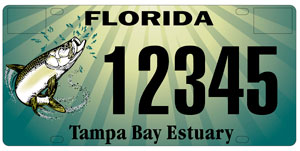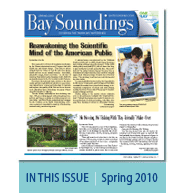 |
||||||||
Specialty Tag Costs Rise, Revenues Drop
By Victoria Parsons

In yet another example of the law of unintended consequences, increased fees for specialty license plates may end up costing state government $1 million a year — with environmental groups and other charities losing an estimated $5 million annually.
Last year, the Florida Legislature increased the first-time cost for a specialty plate from $14 to $33, not including the $15 to $25 charitable donation, at the same time they increased the cost of vehicle registration by 35%. New sales of specialty plates plummeted from 32,165 in January 2009 to just 9,371 in January 2010.
Locally, the Tampa Bay Estuary Program, which has relied on sales of its Tampa Bay Estuary specialty tag (the “Tarpon Tag”) to fund more than $1 million in community-based restoration and education projects through its Mini-Grant program, has been forced to lower the ceiling on grant awards for next year from $7,500 to $5,000 per project.
“Incoming funds from the Tarpon Tag sales are down 20% from the same period last year,” said Ron Hosler, TBEP’s program administrator. “We’re not seeing larger losses because renewals have been steady. What’s really frightening is what happens down the road when we don’t have new tag purchases to replace those that aren’t renewed.”
And while TBEP’s community grants program will be adversely impacted, other programs depend entirely upon license tag revenues. For example, Fish Florida, which teaches kids to fish, is funded entirely by license tag sales and the state’s sea turtle research program is funded through the sale of turtle plates, Hosler said.
The increase in fees has many people questioning the wisdom of paying $33 to make a $15 to $25 charitable donation, adds Michael Towner, a Boca Raton consultant who specializes in specialty plates across the country. “We’re basically asking people to spend 132% to 220% of the cost of their charitable donation on fees, and that’s a hard argument to make.”
From the state’s perspective, instead of seeing increased revenues from higher fees, it’s losing the original $12 new plate fee and annual processing fees of $5 when a registrant does not purchase or renew a specialty plate, Towner said. “That’s a loss of about $1 million per year, plus the state takes over $600,000 every year directly from the proceeds of the charitable donations to administer the program.”
And while some law enforcement agencies may welcome the drop in sales of specialty tags because it may be more difficult to identify which state issued the tag, Towner says technology has made that a moot point. “A police car can drive down the aisle of the parking lot at a Buc’s game with cameras scanning every tag,” Towner said. “At the end of the row, they’ll have a computer-generated list of every BOLO (be on the lookout), stolen car and every late tag.”
The 2010 legislature did not address the problems caused by the fee increases, but Towner expects it to become an issue in the future. “More than 1.6 million people bought specialty tags so there’s obviously a great deal of support for the program,” he said. “Most people don’t yet recognize the impact on the 113 social, cultural and environmental missions who counted on the $5 million raised through specialty tags. As those organizations feel the pinch, I’m sure more legislators will hear about it.”
